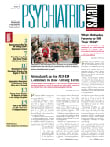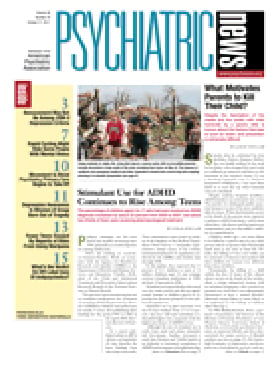Is compulsive hoarding a component of obsessive-compulsive disorder (OCD) or something else entirely? That's one of the questions being considered by DSM-5 Task Force members as they move toward publication of the manual's next edition in May 2013.
The DSM-5 Anxiety, Obsessive-Compulsive Spectrum, Posttraumatic, and Dissociative Disorders Work Group conducted a focused review of the literature on compulsive hoarding (published in the June 2010 Depression and Anxiety) and recommended the classification of hoarding disorder (HD) as a separate entity, although the group is still examining the evidence as to whether inclusion is merited in the main manual or in the "Appendix for Further Research." Their publication includes working diagnostic criteria for compulsive hoarding and mentions several clinician and self-administered measures that have been developed to reflect these criteria and are widely used in the field. They include the Saving Inventory-Revised, the Hoarding Rating Scale, and the UCLA Hoarding Severity Scale.
Randy Frost, Ph.D., a professor of psychology at Smith College in Northampton, Mass., and colleagues have recently characterized HD by examining comorbidities associated with the disorder, making HD appear even less as simply a subtype of OCD or even of obsessive-compulsive personality disorder.
Frost and colleagues recruited participants with "a large amount of clutter, trouble using rooms in the home, or difficulty throwing things away" from health and mental health clinic settings, newspaper and information Web sites, and investigator media appearances. They then evaluated psychiatric comorbidity in a sample of 217 people who met the diagnostic criteria for HD outlined by the work group and compared that cohort with data for 96 participants meeting criteria for OCD without HD.
Relatively few HD-diagnosed participants were diagnosed with OCD. Other disorders, including major depressive disorder (MDD), generalized anxiety disorder, and social phobia were more frequent among HD subjects than were OCD cases. MDD was the most frequent comorbid condition among HD patients, with more than half the sample receiving that diagnosis. Inattentive attention-deficit/hyperactivity disorder was significantly more frequent in HD than in OCD, evident in nearly 30 percent of HD participants.
Doesn't Appear to Be OCD Subtype
"This finding accords with recent research suggesting that hoarding is not a subtype of OCD, but instead a distinct condition related to a variety of disorders," Frost and colleagues wrote.
Frost told Psychiatric News that these findings open the way for further research of HD: "We are working on a host of new studies, some having to do with the phenomenology of HD, and some having to do with interventions. For example, we are doing some basic research on the process of acquiring. How are decisions about acquiring being made, and what features are associated with those decisions? Exactly how does the process of discarding things go awry? Many people with hoarding disorder try to discard, but are unsuccessful. What gets in their way?"
Animal Hoarding Also Studied
In a separate report in the June 2010 Depression and Anxiety, Frost and Gary Patronek, V.M.D., Ph.D., a clinical assistant professor at the Cummings School of Veterinary Medicine at Tufts University, presented a comparison of object and animal hoarding. They examined the ways in which people who hoard animals differ from people who hoard objects.
"Because of the dissimilarities, inclusion of a description of animal hoarding in the text accompanying the diagnostic criteria in DSM-5 may be needed to clarify whether it should be considered as a separate subtype or hoarding disorder," they noted. "Basic studies of animal hoarding, comorbidity, neural substrates, information-processing deficits, and family features are all sorely needed."
Frost explained that a problem with studying animal hoarding is that few sufferers voluntarily seek treatment, and few volunteer to be study participants. "This is slowly changing as researchers learn how to find and successfully recruit these individuals for study," said Frost, who believes there will be many more researchers studying HD and animal hoarding once the DSM-5 is published.
The research was funded by grants from the National Institute of Mental Health and research funding from Organon/Merck, Endo Pharmaceuticals, and Eli Lilly.


